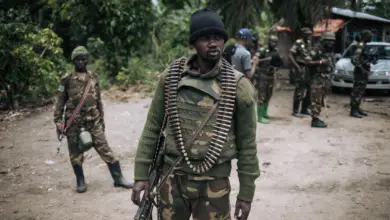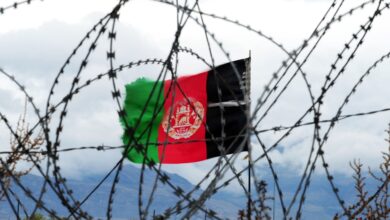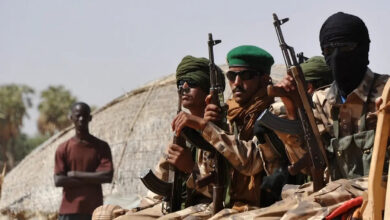Dozens of people were killed in a “terrorist attack” on a military post in the northeastern Menaka region of Mali on Friday, November 1, the government said.
“Following the attack on a FAMa position in Indelimane, reinforcements who were dispatched found 54 bodies including 1 civilian, 10 survivors, and found significant material damage,” Communications Minister Yaya Sangare tweeted on Friday. “The situation is under control. Clearance operations and the process of identifiying bodies is continuing.”
On Saturday, the Malian Armed Forces (FAMa) gave a revised toll of 49 dead and three injured, adding that around 20 survivors were recovered.
Earlier on Friday, FAMa said that “the situation in Indelilmane is under FAMa control,” adding that a provisional toll was “35 deaths on the FAMa side.” Previously, FAMa said the attack on the outpost in Indelimane in the locality of Ansongo in the Ménaka region had left 15 dead.
Some FAMa personnel were declared missing during the attack, a military source earlier told AFP.
In a communique, Mali’s government condemned the “terrorist attack” in Indelimane, also written In-Delimane, saying it had “resulted in deaths, numerous injuries and significant material damage.”
“Reinforcements have been dispatched to secure the area and track down the attackers,” it said.
“The Government of Mali welcomes all the international forces present on our territory who are providing support and assistance to our defence and security forces on the ground to neutralize the enemy,” it added.
In a Saturday, statement Islamic State said fighters from its West Africa Province affiliate were responsible for the attack, claiming that 70 soldiers were killed or injured, and that weapons, ammunition and vehicles were captured.
In a later statement, ISIS claimed ISWAP fighters were responsible for a roadside bomb blast that killed a French soldier between Gao and Menaka earlier that day. ISIS claimed that attack was also in the Indelimane area.
The attacks came just a month after at least 40 Malian soldiers were killed in simultaneous raids claimed by al-Qaeda-affiliiate JNIM in Boulkessi and Mondoro, near central Mali’s border with Burkina Faso, one of the deadliest attacks against Mali’s military in recent insurgent violence.
Many armed groups are active in Mali and the wider Sahel region, but the majority of attacks are attributed to the Group to Support Islam and Muslims (JNIM) which formed in March 2017 from a merger of several smaller groups including the Sahara branch of al-Qaeda in the Islamic Maghreb, Ansar Dine and Al-Mourabitoun. JNIM’s leadership has pledged allegiance to al-Qaeda leader Ayman al-Zawahiri.
Islamic State-affiliated groups are also active. Since May, ISIS has attributed insurgent activities in the Mali-Burkina Faso-Niger tri-border area to its West Africa Province affiliate, rather than to what was previously known as Islamic State in the Greater Sahara.
In 2012 a Tuareg separatist uprising against the state was exploited by Islamist extremists linked to al-Qaeda who took key cities in the desert north of Mali.
France began its Operation Serval military intervention in its former colony early the next year, driving the jihadists from the towns, and the MINUSMA peacekeeping force was then established.
But the militant groups morphed into more nimble formations operating in rural areas, and the insurgency has gradually spread to central and southern regions of Mali and across the borders into neighboring Burkina Faso and Niger. Large swathes of Mali remain outside government control, and inter-ethnic bloodshed is a regular occurrence.
The Serval mission evolved in August 2014 into Operation Barkhane, which has a mandate for counter-terrorism operations across the Sahel. Roughly 4,500 French troops are deployed in the region, including around 2,700 soldiers in Mali. Personnel from Estonia and helicopters from the United Kingdom support the Barkhane force, and Denmark is to send two helicopters and up to 70 troops in December.
Barkhane focuses activity in insurgent-hit Mali, Burkina Faso, and Niger, and troops work alongside other international operations, including the roughly 14,000-strong MINUSMA United Nations stabilization mission in Mali, and the G5 Sahel Joint Force, the long-planned 4,500-strong joint counter-terrorism force comprising troops from Burkina Faso, Chad, Mali, Niger and Mauritania.
France spearheaded the G5 Sahel initiative, but it has been undermined by lack of training, poor equipment and a shortage of funds. United Nations Secretary-General Antonio Gutteres has long-called for regular U.N. funding for the G5 Sahel Joint Force, but the U.S. has pushed back against direct funding, preferring instead bilateral funding for individual states.
France has begun asking its European partners to send special forces to the Sahel to assist and improve the basic training for local forces, and hopes to form a new Combined Joint Special Operations Task Force under French command.
U.S. officials said in August that the U.S. will seek additional contributions from the Global Coalition Against ISIS to combat the group and its affiliates in Africa.
At the request of France, members of the U.S.-led Coalition will meet in Washington on November 14.
With reporting from AFP. This post was updated on November 2.












